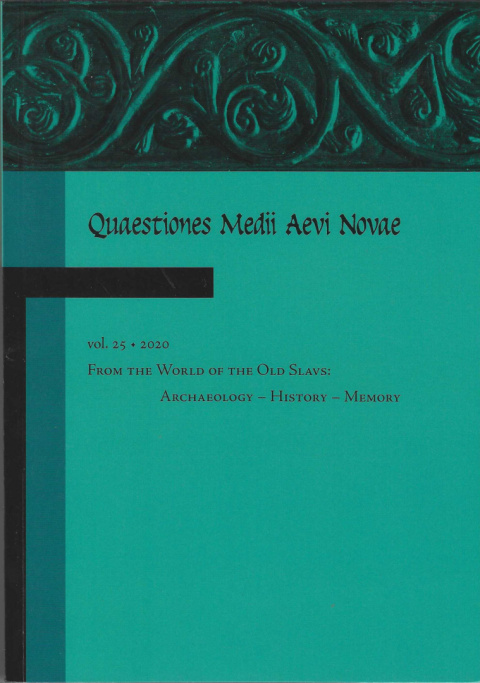-
Koszyk jest pusty
-
x

-
Koszyk jest pusty
-
x
- Kategorie
-
Quaestiones Medii Aevi Novae, vol. 25 (2020) - From the World of the Old Slavs: Archaeology – History – Memory


| Wpisz swój e-mail |
| Wysyłka w ciągu | 24 godziny |
| Cena przesyłki | 11 |
| Dostępność |
Brak towaru
|
| Kod kreskowy | |
| ISBN | 14274418 |
| EAN | 14274418 |
| Zostaw telefon |
Redakcja: Wojciech Fałkowski
Rok wydania: 2020
Liczba stron: 474
Okładka: miękka
Format: 16,5 cm x 23,5 cm
Uwagi - okładka z lekkimi zatarciami
Książka w językach: angielskim i niemickim
"In about 1120 the Polish ruler Bolesław III the Wrymouth subdued Western Pomerania in a military campaign. One of the conditions of the peace treaty concluded stipulated that the conquered would adopt Christianity. Implemention of this provision was a task beyond the capabilities of the local ruler, i.e., the western-Pomeranian duke Wartislaw. Although he was baptized, his rule relied on the support of his pagan subjects. He had to take into account not only the consent of the lords, but also of the assemblies that were strictly connected with native pre-Christian worship and functioned in the main centres of the local communities"
(from: Stanisław Rosik Triglav and the “God of the Germans” in Szczecin in the 1120s. From studies of the religion of the Slavs and its Christian interpretation in the Middle Ages (an example of Otto of Bamberg’s hagiography)
Contents:
I.From the World of the Old Slavs: Archaeology – History – Memory /5
Tomasz Jasiński. Betrachtungen zur Urheimat der Slawen /5
Stanisław Rosik Triglav and the “God of the Germans” in Szczecin in the 1120s. From studies of the religion of the Slavs and its Christian interpretation in the Middle Ages (an example of Otto of Bamberg’s hagiography) /47
Andrzej Janowski. Development of early medieval strongholds in the Rega basin /79
Felix BiermannVorgeschichtliche Ringwälle der Niederlausitz im frühen Mittelalter und die Lage der polnischen Burg Sciciani /101
Andrzej Pleszczyński Back to the Middle Ages: The longue durée of stereotypes in the mutual perception of Germans and Poles /135
Paweł Migdalski. Early-medieval Slavdom as a factor legitimizing the Polish presence westward as exemplified by Western Pomerania /163
II. Current Research /181
Sven Ekdah. lMoscow troops in the wars of Poland and Lithuania with the Teutonic Order in Prussia in 1414 And 1422: Two timeline question /181
Loïc Chollet. Le cheval et la mort. Rites funéraires, éthique chevaleresque et représentation de l’altérité culturelle lors de la croisade balte /193
Grzegorz Jawor. Portée sociale des stéréotypes concernant les habitants des villages valaques en Pologne aux XVe et XVIe siècles /221
Rafał Kubicki. Last wills of townspeople in Late-Medieval Elbląg as compared to other Baltic towns (Gdańsk, Lübeck, Stralsund, and Tallinn) /237
Krzysztof Kwiatkowski The informativeness of Wigand von Marburg’s chronicle and its Latin translation in relation to weaponry /263
Piotr Pranke. Do ut des: The role of ecclesiastical institutions in the functioning of the Carolingian and Ottonian trade system /291
Joanna Sobiesiak. A bronze seven-branch candelabra that was purportedly brought to Prague from Vladislav II’s Italian expedition of 1158. Lore on the artifact in medieval and modern Czech texts /333
Adrien Quéret-Podesta. Le problème des compilations annalistiques étrangères utilisées par les plus anciennes annales polonaises à la lumière des recherches récente /343
Agnieszka Teterycz-Puzio. “Bolesław, Duke of Greater Poland, Mazovia, and Łęczyca”. Who was the first Piast owner of Szczerbiec – the jagged coronation sword of Polish kings? /359
Wiesław Długokęcki. Aus der Geschichte der Karavelle „Peter von Danzig” /373
III. In Memoriam /411
Professor János Bak (1929-2020) /411
Professor Jerzy Hauziński (1946-2020) /419
IV. Book Notices /4
Authors /469
Contents /473
